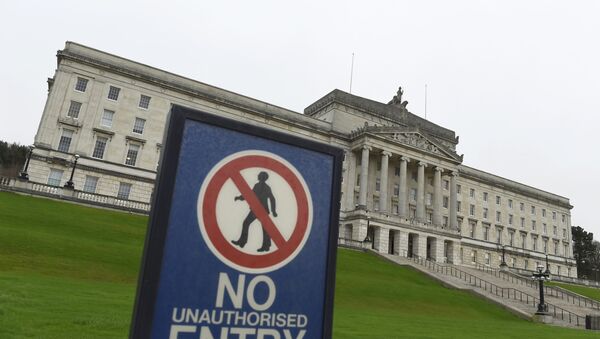Under the terms of the Northern Ireland Act 1998, the devolved government in Belfast must comprise the largest party from each of the unionist and nationalist communities, and must be headed by nominees of those two parties.
However, when Sinn Fein's Martin McGuinness resigned, January 9, as deputy First Minister, it triggered the automatic loss of office of the DUP's First Minister Arlene Foster and the effective collapse of the Northern Ireland administration, the Executive.
Although Sinn Fein can nominate another deputy and restore the Executive, it has refused to do so, leaving a constitutional crisis that — if not resolved in seven days — results in the UK's Secretary of State for Northern Ireland having to call an election.
McGuinness' resignation was — ostensibly — over a green energy scheme originally overseen by Foster, which was supposed to incentivize people to switch to renewable, but which ended in farce when the scheme paid out more than the cost of the fuel, leaving taxpayers with a bill of up to US$486 million.
Further Splits
However, the resignation was taken by most commentators as a sign that the trust between the republicans — those who want realignment with Ireland — and the unionists — those who want to stay within the United Kingdom — as a breakdown in trust.
Showing opposition to DUP contempt for Irish language speakers. 🌞#dearglefearg pic.twitter.com/tgeEDpMwkl
— Declan Mc Aleer MLA (@mc_mla) 12 January 2017
The two parties have also fallen out over an educational bursary scheme that helped Irish language students fund the costs involved in visiting the Gaeltacht region of Donegal, the Republic of Ireland, which lies west of Northern Ireland. The DUP offered — as an "olive branch" — to reinstate cuts to the budget, but this has been refused by Sinn Fein.
"The uneasy partnership between the DUP and Sinn Fein has threatened to fall apart on more than one occasion. Only intensive diplomacy (and extra funding commitments) from the UK and Irish Governments have kept the show on the road," Akash Paun a Fellow at the Institute for Government told Sputnik.
The harder-line DUP and Sinn Fein have been the dominant forces within their respective communities since 2007, having eclipsed their more moderate rivals, the Ulster Unionist Party (UUP) and the Social Democratic and Labour Party (SDLP).
"Until last year, smaller parties sat around the cabinet table alongside the two main parties but in May 2016, the UUP, SDLP and Alliance all opted to enter opposition instead. In one sense, this moved Northern Ireland towards a more 'normal' political framework: with a governing coalition held to account by various opposition parties. However, it also removed centrist parties who could help facilitate compromise."
Statement from @DUPleader pic.twitter.com/teevbrC6xe
— DUP (@duponline) 9 January 2017
"The well-entrenched dominance of the DUP and Sinn Fein makes fundamental political realignment an unlikely outcome of the latest crisis, although minor parties may add to the gains they made at last year's election (see chart). What is more likely to change is the leadership."
Paun says Martin McGuinness has been suffering from undisclosed health problems and may well choose this moment to pass on the baton, while Arlene Foster may or may not ride out the current scandal.
But whoever fills the top jobs, the two old rival parties will almost certainly have to work together again to prevent a complete collapse of devolution and a resumption of direct rule from London.





